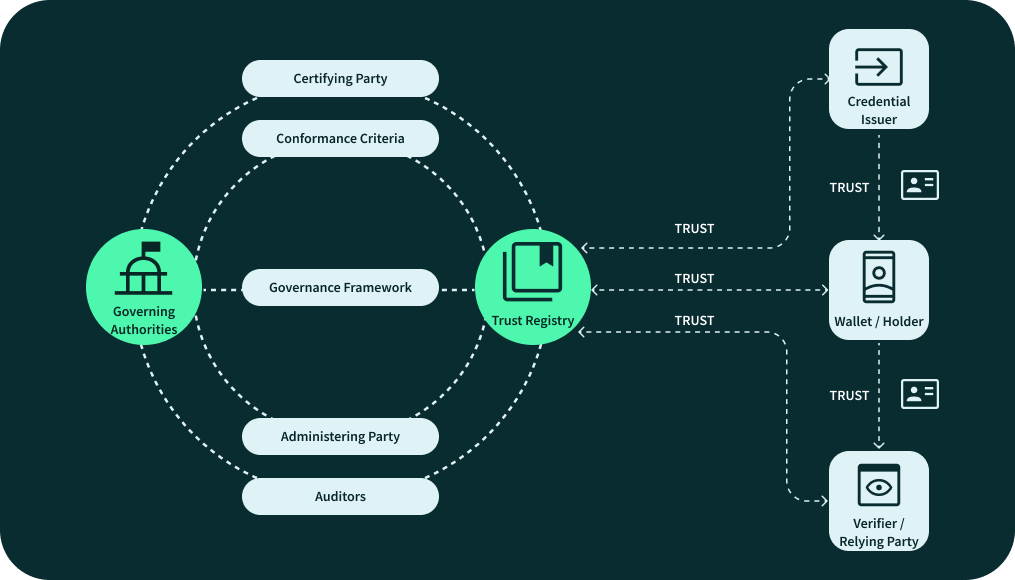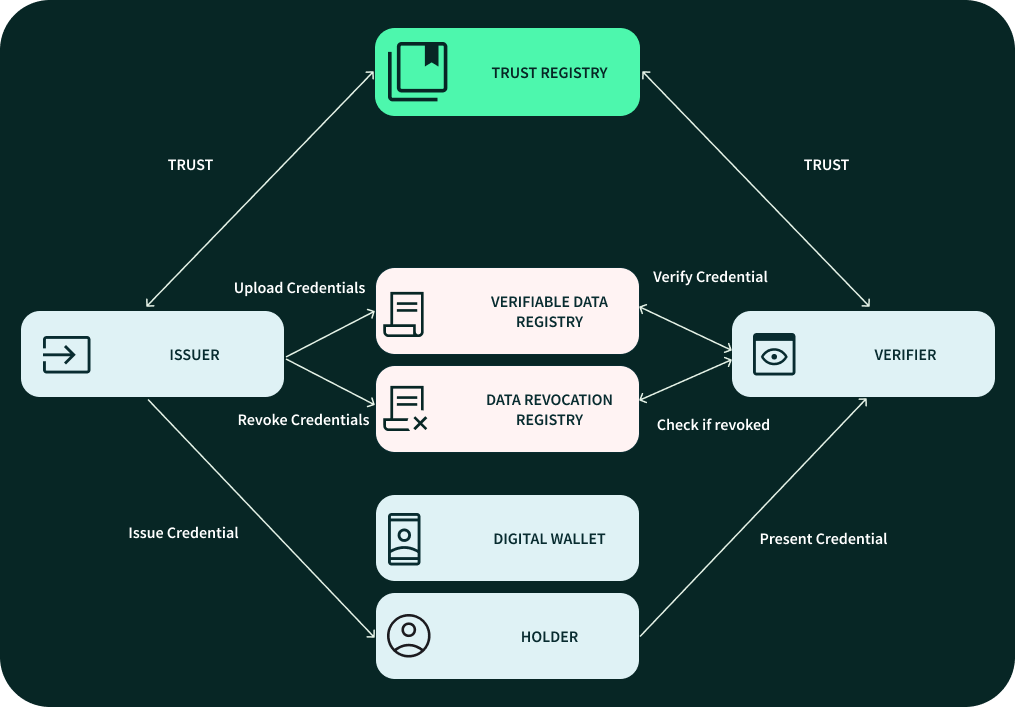What Is a Trust Registry? Scaling Digital Trust for Wallets and Verifiable Credentials
A trust registry is a governance-backed digital directory that lists who is authorized to issue or verify credentials in a decentralized ecosystem. It connects cryptographic credentials exchanged between issuers, verifiers, and vallets to human-readable authority—answering “who is trusted, and why?”
The Problem: Cryptographic Trust Alone Doesn’t Scale
While cryptography is a powerful enabler of trust, it’s not the full picture. At its core, cryptography offers mathematical guarantees: it can ensure that data hasn’t been altered, it can mask communications from prying eyes, it can prove that a private key was used to sign something, and it can even let users reveal only the minimum amount of information needed. But on its own, cryptography doesn’t tell us whether the information is meaningful or reliable in context.
For example, a digital certificate can confirm that content hasn’t been tampered with—but it won’t tell you whether the person who signed it had any legitimate authority. An encrypted message might be secure in transit, but that doesn’t guarantee the sender is trustworthy. And a verifiable credential can confirm a claim is intact and issued by someone—but it won’t explain whether that issuer is recognized, competent, or even permitted to issue such a credential in the first place. They won't answer:
-
Who authorized the issuer?
-
Under what governance framework are their claims meaningful?
-
Can the verifier trust the credential in their context?
This is the missing layer in many digital ecosystems: governance. Without it, cryptographic assurance is technically sound, but contextually blind. This lack of context leads to fragmented trust models, duplicated verification, and massive inefficiencies in onboarding, Know Your Customer (KYC), Know Your Business (KYB), and Know Your Agent (KYA) , credential recognition, and compliance.
The Solution: Governance-Backed Trust Registries
Trust registries address a foundational limitation in decentralized identity systems: cryptography alone can’t establish trust at scale. While cryptographic proofs confirm that a credential hasn’t been altered and is tied to a particular key, they say nothing about whether the issuer is legitimate, entitled, not revoked, or recognized within a given ecosystem. That’s where trust registries come in.
By standardizing how trust is declared and verified, trust registries help reduce verification overhead and eliminate the need to re-establish trust relationships for every transaction. They offer a scalable way to publish, discover, and verify credential issuers in a unified way and without interoperability issues.
Whether you're working in finance, healthcare, education, or public services, trust registries play an important role when establishing trust for issuers and wallets, enabling credential verification with confidence and clarity–through chaining the credential to the authority you can trust.
What Is a Trust Registry?

A trust registry is a governance-backed, machine-readable directory that lists which organizations are authorized to issue or verify specific types of credentials under defined rules. These registries contain digitally signed statements from trusted authorities—providing the missing layer of context that makes verifiable credentials meaningful.
Put simply, a trust registry helps answer key trust questions:
-
Who issued this credential?
-
Were they authorized to do so?
-
Is the credential issuer/verifier/wallet provider valid and active within the ecosystem?
Trust Registries in Modern Identity Infrastructure
Trust registries are becoming a foundational part of digital trust infrastructure. They are especially important in:
-
Wallet-based ecosystems, regardless of:
-
the credential exchange protocol used, such as OpenID for Verifiable Credential Issuance (OpenID4VCI) or OpenID for Verifiable Presentations (OpenID4VP)
-
the credential format, including ISO/IEC 18013-5 mobile driving licences, SD-JWT-VC, or W3C Verifiable Credentials
-
the method used to identify participants, such as decentralized identifiers (DIDs), HTTPS-based identifiers, or X.509 certificates
-
-
Open data ecosystems, where organizations exchange data over APIs regardless of data format
-
Emerging AI agent ecosystems, where autonomous systems rely on trusted credentials to interact securely.
An ideal Trust Registry will support different credential formats and issuance mechanisms by providing the governance and accountability layer that makes credentials not just valid, but also contextually reliable and portable across different domains. Unlike traditional certificate chains or static trust lists, trust registries can enable interoperability across sectors, industries, and jurisdictions. Each ecosystem can define its own rules and roles, while still exposing them in verifiable formats.
Verifiers don’t need to maintain direct integrations with every issuer. Instead, they can consult the relevant trust registry to determine whether an issuer is recognized, what types of credentials they’re allowed to issue, and under what conditions those credentials should be accepted.
→ Learn how Trust can be established: using PKI and X.509 certificates, or OpenID FederationHow Trust Registries Fit Into Digital Trust Ecosystems
Trust registries are not a replacement for verifiable credentials or digital wallets—they’re the missing governance layer that makes them interoperable at scale.
| Component | Role |
|---|---|
| Verifiable Credential | Proves claim is unaltered and issued by a participating entity |
| Digital Wallet / Holder | Stores and shares credentials selectively |
| Issuer | Issues verifiable credentials |
| Verifier | Verifies the credential presented by the holder using their wallet |
| Trust Registry | Confirms issuer is trusted under a known trust and governance framework |

When a verifier receives a credential, they can consult a trust registry to verify the issuer’s legitimacy—without having to build a direct relationship or integration with them.
Why Trust Registies Matter for Ecosystem Builders and Relying Parties
A Shared Foundation for Scalable Digital Trust
In any digital trust ecosystem, the ability to onboard new participants, verify credentials, and ensure interoperability is essential—but it quickly becomes expensive and fragmented without a common trust infrastructure. Trust registries provide that foundation, enabling ecosystems to grow confidently while maintaining strong governance, compliance, and contextual integrity.
Lower Verification Costs, Fewer Integrations
For ecosystem architects and platform builders, trust registries eliminate the need to manage dozens of bespoke integrations for verifying credential issuers. Rather than duplicating identity or compliance checks for each service, a trust registry acts as a single, reusable source of truth. This reduces verification costs, minimizes operational overhead, and accelerates time-to-market for trust-enabled services.
Faster Credential Recognition for Relying Parties
From the perspective of relying parties—whether banks, government agencies, healthcare networks, or private platforms—trust registries simplify the verification process. When a credential is presented, verifiers can consult the registry to determine if the issuer is recognized under a valid governance framework. This accelerates onboarding, reduces friction in high-trust workflows, and improves automation without sacrificing assurance.
Interoperability Across Jurisdictions and Sectors
Perhaps most importantly, trust registries enable cross-ecosystem interoperability. Digital credentials that originate in one jurisdiction or industry can be recognized in another, thanks to the governance-backed structure registries provide. As decentralized identity ecosystems become more global, this capability is critical to ensuring that credentials are not only valid, but also usable across diverse digital environments.
A Critical Complement to Wallets and Verifiable Credentials
Trust registries don’t replace digital wallets or credential protocols—they complete the trust stack. While wallets allow individuals and organizations to hold and present verifiable credentials, registries ensure that those credentials carry governance-backed legitimacy. This combination makes credentials not just secure and portable, but contextually meaningful across domains.
Real-World Use Cases for Trust Registries
Education and Academic Credentials
In the education sector, universities and accrediting bodies use trust registries to signal which institutions are authorized to issue diplomas, degrees, and academic certificates. Verifiers—such as employers or licensing boards—can check these registries to confirm the legitimacy of a credential without needing to contact the issuing institution directly. This streamlines hiring, licensing, and admissions processes while preserving trust in the authenticity of academic records.
Healthcare and Medical Credentialing
Trust registries play a crucial role in healthcare by validating licensed professionals and authorized credential issuers, such as hospitals, medical boards, and regulators. Whether verifying electronic prescriptions or confirming a provider’s certification, registries ensure that only trusted entities can issue and verify sensitive health-related credentials. This infrastructure is essential for maintaining compliance, reducing fraud, and enabling secure data exchange across health systems.
Media and Content Authenticity
In the media industry, where misinformation and deepfakes are growing concerns, trust registries can confirm whether a journalist or outlet is a verified member of an established consortium. Platforms and consumers can consult the registry to determine whether content has a legitimate origin, helping to curb disinformation and promote trust in digital journalism. This model is particularly powerful when combined with content provenance frameworks and digital watermarking standards.
Finance and Regulatory Compliance
Financial institutions increasingly rely on trust registries to identify approved compliance auditors, risk assessors, and service providers. This enables fintech platforms, regulators, and institutions to simplify onboarding and reduce the need for repeated Know Your Customer (KYC) or audit validation. By referencing a registry, firms can ensure that a service provider meets required standards without duplicating verification efforts—improving both trust and efficiency in regulated financial environments.
Government-Issued Identity and Public Services
Trust registries are a natural fit for government-issued digital identity systems, including initiatives like mobile driver’s licenses (mDLs) and national eID programs. These registries clarify which government agencies are authorized to issue and verify official credentials, allowing private-sector verifiers (e.g., banks, airports, employers) to confirm legitimacy without having to rely on paper documents or manual checks. This approach not only increases security but also accelerates digital transformation in public service delivery.
Conclusion
As more organizations adopt verifiable credentials and decentralized identity technologies, one thing is clear: trust doesn’t scale on cryptography alone. Digital credentials can prove that a claim was issued and hasn't been tampered with. Wallets can help individuals control and present those claims. But none of that matters if the verifier is not able to establish trust in an issuer and doesn’t know whether the issuer is legitimate, entitled, or even relevant to the context.
This is the problem that trust registries are built to solve. They add the missing layer of governance that turns digital credentials from technically valid artifacts into meaningful, reliable trust signals. By anchoring credentials to well-defined governance frameworks and publishing authoritative statements in a structured, interoperable format, trust registries enable trust to be portable, discoverable, and verifiable—across sectors, jurisdictions, and platforms.
Whether you're building infrastructure for financial compliance, digital identity, public services, or verifiable academic records, trust registries offer a scalable way to manage authority and legitimacy without rebuilding it for every ecosystem. They reduce cost and complexity by eliminating redundancy, improve security by shifting away from static trust lists, and future-proof your ecosystem by ensuring conformance to evolving governance standards.
Trust Infrastructure
Power Your Ecosystem with a Live Trust Registry
Discover how Raidiam Connect enables governance, participant onboarding, and scalable trust—out of the box.
Get Sandbox Access →